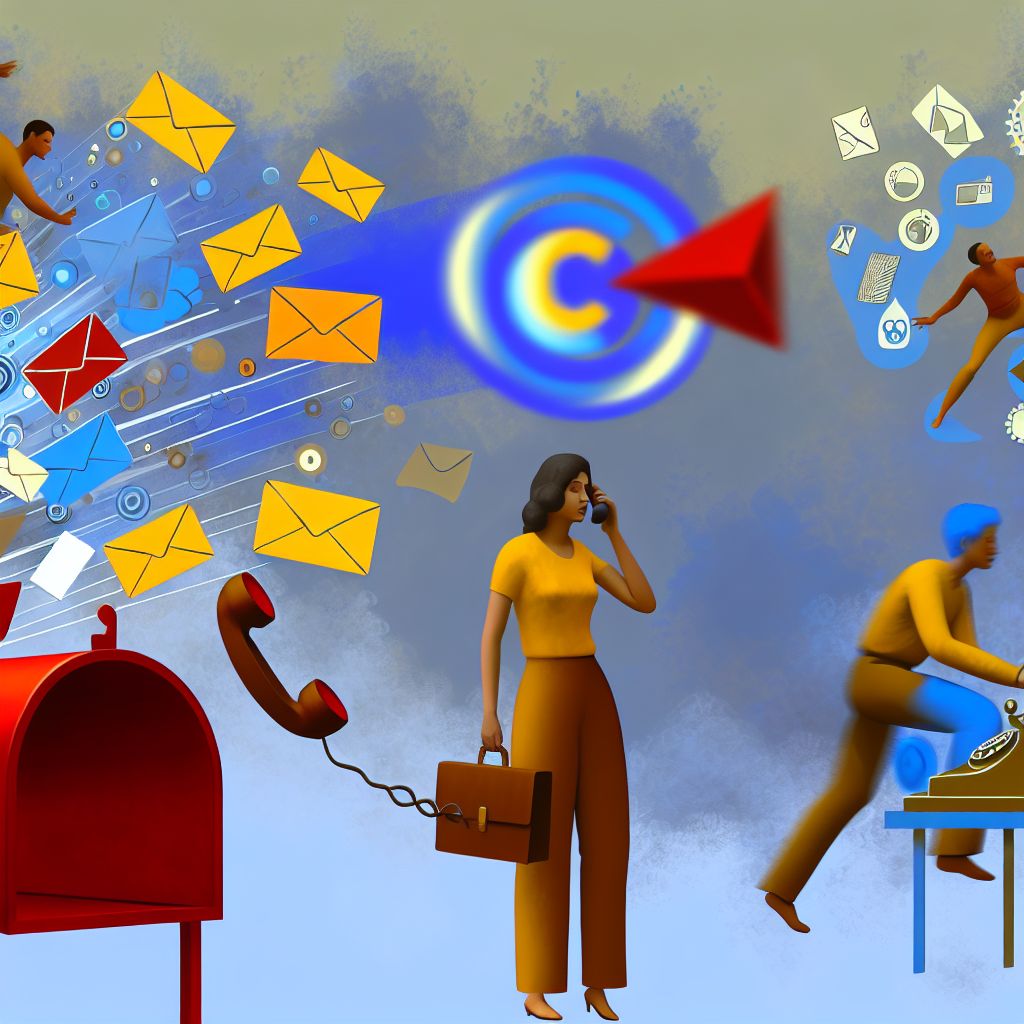Understanding the Reasons Behind Unanswered Texts: A Deep Dive into Non-Responses in Messaging
Text messaging has become an integral part of our daily communication, allowing us to stay connected with friends, family, and colleagues. However, we have all experienced the frustration of sending a text message and never receiving a response. The phenomenon of unanswered texts raises intriguing questions about the dynamics of interpersonal relationships in the digital age.
Why do some messages go unanswered? Is it a deliberate choice or mere oversight? Are there certain types of messages that are more likely to be ignored? These questions have fascinated researchers and psychologists, prompting them to delve deeper into the reasons behind non-responses in messaging.
One possible explanation is that individuals may intentionally choose not to respond to certain messages. This could be due to various factors such as lack of interest, time constraints, or a desire to maintain distance in relationships. Unanswered texts can serve as a means of communication in themselves, conveying a message of disinterest or indifference.
On the other hand, non-responses may sometimes be unintentional. With the constant bombardment of messages we receive on a daily basis, it is easy for some messages to slip through the cracks. The sheer volume of incoming messages can overwhelm individuals, leading to unintentional non-responses. This raises questions about the effectiveness of text messaging as a reliable form of communication.
Understanding the reasons behind unanswered texts is not only important for our personal relationships but also for businesses and organizations. In a professional setting, unanswered messages can lead to misunderstandings, missed opportunities, and damaged relationships. By exploring the dynamics of non-responses, we can develop strategies to improve communication and ensure that our messages are not left unanswered.
In this article, we will delve deeper into the phenomenon of unanswered texts, exploring the different reasons behind non-responses and their implications for our interpersonal relationships. By shedding light on this often frustrating aspect of modern communication, we hope to provide insights and strategies for navigating the world of messaging more effectively.
Why Messages Go Unanswered

Unanswered messages can be frustrating, especially when you're waiting for a response. There are several reasons why messages go unanswered, and understanding these reasons can help you manage your expectations and improve your communication skills.
1. Busy schedule: People lead busy lives and may not always have the time to respond to messages immediately. They may have other priorities or be overwhelmed with their workload. It's important to be patient and understanding when waiting for a response.
2. Lack of interest: Sometimes, messages go unanswered because the recipient is simply not interested in the topic or conversation. They may not see the message as important or relevant to them. It's essential to consider the recipient's perspective and ensure your messages are engaging and meaningful.
3. Technical issues: Technical issues such as network problems, device malfunctions, or software glitches can prevent messages from being delivered or received. It's important to check if there are any technical issues and consider alternative methods of communication if necessary.
4. Forgetting or overlooking: With the abundance of messages we receive daily, it's easy for messages to get overlooked or forgotten. This can happen especially if the message is not marked as urgent or if it gets buried in a crowded inbox. Following up politely can help draw attention to your message.
5. Lack of clarity or context: Messages that are unclear or lack context can be confusing and may prompt the recipient to delay or avoid responding. It's important to be concise, specific, and provide enough information for the recipient to understand the purpose and importance of the message.
6. Avoidance or conflict: In some cases, messages may go unanswered because the recipient wants to avoid conflict or uncomfortable conversations. They may choose to ignore the message rather than engage in a potentially difficult discussion. It's important to be mindful of the recipient's comfort level and approach sensitive topics with care.
7. Personal reasons: Sometimes, personal circumstances or events in someone's life can prevent them from responding to messages promptly. They may be dealing with a crisis, illness, or other personal matters that take precedence over communication. It's important to be understanding and offer support if needed.
In conclusion, messages go unanswered for various reasons, ranging from busy schedules and lack of interest to technical issues and personal reasons. Being patient, clear, and considerate in your communication can help increase the chances of receiving a response.
When texts go unanswered?
Have you ever sent a text message and received no response? It can be frustrating and leave you wondering why the person on the other end didn't reply. There are a few reasons why texts go unanswered, and it's important to understand that it may not always be personal.
One common reason for unanswered texts is simply that the person is busy. They may be in a meeting, driving, or otherwise occupied and unable to respond at that moment. It's important to be patient and not jump to conclusions about why they haven't replied. Give them some time and they may respond later when they are available.
Another possibility is that the person simply missed your message. With the constant stream of notifications and messages we receive on our phones, it's easy for a text to get lost in the shuffle. In this case, it can be helpful to send a follow-up message or try reaching out through another medium, such as a phone call or email.
It's also worth considering that the person may not know how to respond to your message. Sometimes texts can be ambiguous or require a thoughtful response, and the person may need some time to think about what to say. Again, patience is key in these situations.
Of course, there is always the possibility that the person is intentionally ignoring your text. While this can be hurtful, it's important not to jump to conclusions without knowing the full story. They may have a valid reason for not responding or may simply not be in the mood to engage in a conversation at that time.
In conclusion, there are many reasons why texts go unanswered, and it's important not to take it personally. Give the person some time and space, and if necessary, try reaching out through another medium. Remember, communication is a two-way street, and sometimes people just need a little extra time to respond.
Why are my messages suddenly not going through?
Experiencing issues with messages not going through can be frustrating and confusing. There can be several reasons why your messages are suddenly not being delivered:
| 1. Network or internet connectivity issues: | Check your network connection or internet connectivity. Poor signal strength or a weak internet connection can prevent your messages from being sent. Try switching to a different network or restarting your device to see if that resolves the issue. |
| 2. Server or service outage: | There might be a temporary server or service outage on the messaging platform you are using. This can prevent your messages from being delivered. Check the platform's official website or social media accounts for any announcements or updates regarding outages or service disruptions. |
| 3. Blocked or blacklisted: | It's possible that your messages are not going through because you have been blocked or blacklisted by the recipient. This can happen if the recipient has marked your messages as spam or if your number or account has been flagged for suspicious activity. Try reaching out to the recipient through a different method or contact the platform's support team for assistance. |
| 4. Technical issues with the messaging app: | The messaging app you are using may have encountered a technical glitch or bug that is preventing your messages from being sent. Try updating the app to the latest version or reinstalling it to see if that resolves the issue. |
| 5. Incorrect contact information: | Double-check the contact information of the recipient to ensure that you have entered it correctly. A small typo or mistake in the phone number or email address can result in your messages not being delivered to the intended recipient. |
If none of these reasons seem to apply to your situation, it may be helpful to contact your service provider or the support team of the messaging platform you are using for further assistance and troubleshooting.
'Seen' But No Reply: Common Scenarios

When it comes to messaging, we've all experienced that frustrating moment when someone has read our message but hasn't bothered to reply. It leaves us wondering why they chose not to respond and can even lead to feelings of rejection or frustration.
Here are some common scenarios where the recipient has seen our message but failed to reply:
1. Busy or Preoccupied:One of the most common reasons for not replying is simply being busy or preoccupied with other tasks. The person may have seen your message but didn't have the time or mental capacity to respond at that moment.
2. Uninterested or Indifferent:Another possible scenario is that the person is uninterested or indifferent towards the message. They may have read it but didn't feel compelled to reply due to lack of interest or investment in the conversation.
3. Forgotten or Overlooked:Sometimes, people may unintentionally forget or overlook a message, especially if they receive a high volume of messages. It's possible that they saw your message but it slipped their mind to respond later.
4. Uncertain or Confused:In some cases, the recipient may have read the message but didn't know how to reply or were uncertain about what to say. This can happen when the message requires a complex or difficult response.
5. Avoidance or Conflict:Lastly, it's possible that the person is intentionally avoiding your message or trying to avoid a potential conflict. They may have chosen not to reply to prevent further discussion or confrontation.
Remember, there can be various reasons why someone doesn't reply to a message even after seeing it. It's important not to jump to conclusions or take it personally. Communication can be complex, and it's crucial to give people the benefit of the doubt in these situations.
Ultimately, if a lack of response becomes a pattern or starts affecting your relationship, it may be worth addressing the issue directly with the person to gain clarity and understanding.
Is it disrespectful to not respond to a text?
In today's digital age, communication has become increasingly reliant on text messaging. While this form of communication offers convenience and efficiency, it also presents new social challenges. One such challenge is the issue of not responding to text messages. Many people wonder if it is disrespectful to not reply to a text.
It is important to consider the context and the relationship between the sender and the recipient when evaluating whether not responding to a text is disrespectful. In some situations, not responding may indeed be considered disrespectful. For example, if someone reaches out with an urgent or important message, failing to respond can leave the sender feeling ignored or unimportant. Additionally, if someone repeatedly ignores messages from a specific person, it can be seen as a sign of disrespect or indifference towards that individual.
However, there are also scenarios where not responding to a text may be acceptable or even expected. For instance, if someone sends a text that does not require a response, such as a simple greeting or an update on their day, it may not be necessary to reply. Similarly, if the sender knows that the recipient is unavailable or busy, such as during work hours or while they are in a meeting, not responding may be understandable.
It is important to remember that everyone has different communication preferences and expectations. Some individuals may prioritize immediate responses and find it disrespectful when someone does not reply promptly. Others may be more understanding and recognize that people have different schedules and obligations that may prevent them from responding right away.
In conclusion, whether not responding to a text is disrespectful depends on the specific circumstances and the individuals involved. Open and honest communication is key to understanding each other's expectations and avoiding misunderstandings. Ultimately, it is important to approach text messaging with respect and consideration for others to maintain healthy and positive relationships.
How do you talk to someone who is not responding?
Dealing with someone who is not responding to your messages can be frustrating and challenging. However, there are a few strategies you can try to initiate a conversation or understand the reasons behind their silence.
1. Give them some space:People may not respond for various reasons, such as being busy, needing time to process information, or simply not being in the mood to talk. It is essential to respect their boundaries and give them the space they need.
2. Send a gentle reminder:Sometimes, a gentle reminder can prompt someone to respond. Keep your message brief and polite, making it clear that you would appreciate a response but without pressuring them.
3. Use a different communication channel:If you have been trying to reach someone through a specific messaging platform or email, consider using a different channel. They may be more responsive to a different method of communication.
4. Express your concerns:If the lack of response is causing you distress or worry, it might be worth expressing your concerns to the person. Let them know how their silence is making you feel and ask if everything is okay.
5. Be understanding:Remember that everyone has their own reasons for not responding promptly. Avoid jumping to conclusions or assuming the worst. Give them the benefit of the doubt and try to be understanding.
6. Reflect on your message:Take a moment to reflect on the messages you have been sending. Could they be misinterpreted or overwhelming? It is important to consider how your words might be affecting the other person.
7. Seek support from others:If you are feeling frustrated or confused by the lack of response, consider seeking support from friends or family. They may offer advice or perspective on the situation.
8. Accept the possibility of a non-response:Despite your efforts, it is crucial to accept that some people may choose not to respond. It is their prerogative, and it is important to respect their decision.
Remember, communication is a two-way street, and sometimes, people may not respond for reasons beyond your control. Stay patient, understanding, and open to the possibility of re-engaging in the conversation when the time is right.
Handling No Response in Text Conversations

When engaging in text conversations, it is not uncommon to encounter situations where a message goes unanswered. This can be frustrating and leave one wondering how to handle the lack of response. Here are some strategies to effectively deal with no response in text conversations:
- Give the benefit of the doubt: It's important to remember that people have busy lives and may not always have the time or opportunity to respond immediately. Instead of assuming the worst, try to give them the benefit of the doubt and be patient.
- Send a gentle reminder: If a significant amount of time has passed without receiving a response, it is acceptable to send a gentle reminder. This can be done by politely asking if they had a chance to read the message or if they need any further information.
- Consider alternate communication methods: If the lack of response persists and the conversation is time-sensitive or important, it may be worth considering alternative communication methods. This could include calling the person, sending an email, or even meeting in person.
- Acknowledge and move on: In some cases, it may be best to acknowledge that the person is not responding and move on. Dwelling on the lack of response can be unproductive and may strain the relationship. Instead, focus on other conversations or tasks at hand.
- Reflect on your message: It is also important to reflect on the content and tone of your message. Did it require a response? Was it clear and concise? Sometimes, a lack of response can be attributed to the message itself, so consider making adjustments for future conversations.
By implementing these strategies, you can effectively handle the lack of response in text conversations and maintain positive communication with others. Remember, everyone has different priorities and circumstances, so it's important to be understanding and adaptable in your approach.
How do you follow up on a text message with no response?
When you send a text message and receive no response, it can be frustrating and leave you wondering what to do next. Here are some suggestions for following up on a text message that has gone unanswered:
1. Give it some time:People are often busy and may not be able to respond immediately. Wait a reasonable amount of time before following up, as bombarding someone with messages can be pushy and annoying.
2. Send a gentle reminder:If it has been a while and you still haven't received a response, it is okay to send a friendly reminder. Keep the message light and casual, without pressuring the person to respond.
3. Change the topic:If you have sent multiple messages on the same topic with no response, try changing the subject. It could be that the person is not interested in or doesn't have anything to say about the original topic, but might be more responsive to a different one.
4. Ask if everything is okay:Sometimes, a lack of response could indicate that something is wrong or the person is going through a difficult time. In such cases, it is appropriate to express concern and ask if everything is alright.
5. Call or meet in person:If the matter is urgent or requires immediate attention, consider calling or meeting the person in person. Sometimes, a text message can be easily overlooked, but a phone call or face-to-face conversation can grab their attention and prompt a response.
6. Respect their boundaries:It's important to remember that not everyone enjoys constant communication or feels obligated to respond to every message. If you have followed up multiple times with no response, it may be best to respect their boundaries and give them space.
Remember, everyone has different communication preferences and circumstances that may impact their ability to respond. It's important to be understanding and patient when following up on a text message with no response.
What to text when someone is ignoring you?
Being ignored can be frustrating and disheartening, especially when it comes to texting. If you find yourself in a situation where someone is consistently ignoring your texts, it's important to approach the situation with patience and understanding. Here are a few things you can consider texting when someone is ignoring you:
- Give them space: Sometimes people need some time alone to process their thoughts or deal with personal issues. It's important to respect their need for space and avoid bombarding them with messages.
- Check in with them: Instead of jumping to conclusions or assuming the worst, you can send a simple text asking if everything is okay. This shows that you care and gives them an opportunity to respond if they're ready.
- Apologize if necessary: If you think you might have done something to upset the person, it's always a good idea to apologize. Keep the apology concise and sincere, taking responsibility for your actions.
- Suggest meeting in person: Sometimes miscommunication or misunderstandings can occur over text. If you feel that the situation would be better resolved face-to-face, suggest meeting up to talk things through.
- Express your feelings: In a calm and non-confrontational manner, you can let the person know how their behavior is making you feel. However, it's important to avoid being accusatory or aggressive in your message.
- Move on: If you have tried reaching out multiple times and still receive no response, it may be time to accept that the person may not be interested in continuing the conversation. It's important to prioritize your own well-being and not dwell on unanswered messages.
Remember, everyone has different reasons for not responding to texts, and it's essential to take their perspective into consideration. Communication is a two-way street, and sometimes the best course of action is to give the person space or to let go if they're not interested.
Online Activity and Messaging Patterns

Understanding online activity and messaging patterns is crucial in examining the phenomenon of unanswered texts. With the increasing prevalence of digital communication, it is important to study how people engage with messaging platforms and the underlying reasons for non-responses.
One common pattern observed in online activity is the sporadic nature of messaging. People often engage in bursts of communication, followed by periods of inactivity. This can be attributed to various factors, such as work commitments, personal obligations, or simply the need for a break from constant digital interaction.
Another pattern that emerges is the difference in response times between individuals. Some individuals may be more prompt in their replies, while others may take longer to respond. This can be influenced by factors such as the individual's personality traits, communication style, or their perceived urgency of the message.
Furthermore, the time of day also plays a role in messaging patterns. People may be more active and responsive during certain hours, while less engaged during others. This can be influenced by factors such as work schedules, time zone differences, or personal preferences for communication during specific times.
Additionally, the content and context of the message can impact response patterns. Some messages may require more thought or consideration before responding, resulting in delayed replies. On the other hand, messages that are urgent or time-sensitive may elicit quicker responses.
Overall, studying online activity and messaging patterns provides valuable insights into the dynamics of communication and helps shed light on the reasons behind unanswered texts. By understanding these patterns, we can develop strategies to improve communication effectiveness and minimize non-responses.









